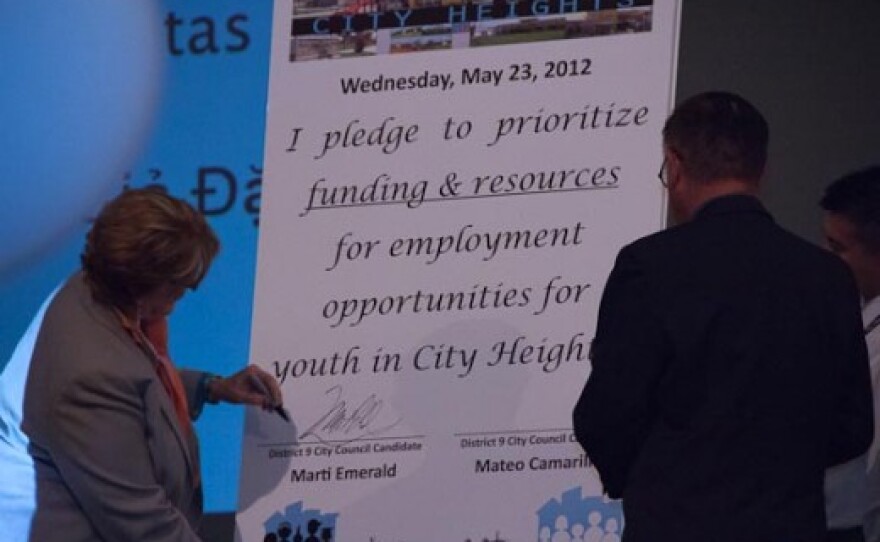Mayor Bob Filner's appearance at a City Heights skate park rally this month might have seemed like a random stop on his dizzying #FilnerEverywhere victory lap. Voice of San Diego's Lisa Halverstadt had that encounter right – he sauntered into the auditorium late and unannounced, then electrified the crowd with a quick promise to get the neighborhood a skate park.

But Filner's appearance was anything but random. It was the apex of a calculated, youth-led campaign that moved the issue from a City Heights utility road where skaters grind on curbs to the headlines of nearly every San Diego media outlet, and finally to the new mayor's to-do list.
The youth, who are involved with the City Heights community health nonprofit Mid-City Community Advocacy Network, have been putting out videos, reaching out to residents with skate demos and touring potential park sites with local decision-makers.
Forget the stereotype that pegs kids with shaggy haircuts and skate decks as wayward youth. These kids have a clear mission, a slick brand identity and – better yet – the attention of your elected officials.
And they want more than a skate park.
Here are five other ways City Heights youth flexed their civic muscles in 2012:
A Pledge in Lieu of a Vote
In May, the Mid-City CAN Youth Council hosted a debate for the City Council District 9 race, which Councilwoman Marti Emerald won in the primary.
The Hoover High School auditorium where the event was held was decked out in red, white and blue balloons. There was a podium and two sparring candidates. The event had all the makings of a traditional debate. But there was a twist.
The people running the event and sitting in the audience couldn't vote. So they got the candidates to sign pledges. Emerald and Mateo Camarillo slapped their signatures on promises to bring more youth job opportunities to the neighborhood, start a District 9 youth advisory council, build a skate park and find funding for free youth bus passes. In theory, the teens would get what they wanted no matter who won.
Free Youth Bus Passes
The teens used the same tactic at a May community rally for better transit. Emerald signed the pledge for free bus passes once more, and this time around was joined by Filner.
The teens also asked Emerald to trade her seat on the San Diego Association of Government's public safety committee for one on its transportation committee, which would give her leverage to fulfill her promise. At the time, she said the move would need approval from the mayor. As of December, that transition has not happened.
The teens told the candidates the $432 annual cost is too much for low-income families to shoulder, especially with cuts to school bus routes increasing their reliance on city buses. They've suggested regional planning officials adjust current appropriations or go after state grants to fund the passes.
A San Francisco decision to offer free MUNI passes to low-income youth has buoyed that plan. The pilot program is funded through a state grant.
In November, the City Heights group met with the San Diego Metropolitan Transit System Board of Directors, which agreed to look into the matter.
A Say in the Mayoral Election
High School students in the Latino Youth Council and other youth leadership groups also joined the political sphere this year. Shortly before Election Day, they asked mayoral candidates Filner and Carl DeMaio to answer a questionnaire on bullying, underage drinking and how they'd include kids in city government.
Much like Mid-City CAN's pledges, the completed surveys were seen as contracts.
"Basically, we want to hold them responsible and accountable,” Judith Uriostegui, 16, said. “Like, if they said they’re going to do specific things, we want to make sure they do them."
An Advocate at City Hall
Just in case all those promises made to City Heights youth on the campaign trail fall by the wayside, youth involved with the Supportive Parents Information Network, a nonprofit for low-income families, have one other measure in place.
In October, kids as young as 8 years old asked the city's volunteer-based Human Relations Commission to advocate on their behalf in city budget negotiations. Curbed library hours, bus fare increases and other decisions, they argued, impact residents of all ages.
Their request was well received by the 15-person commission, which advises the mayor and City Council.
"We don’t have any budget but we work with SPIN in this case to elevate the issues," Mark Dillon, the vice-chair of the commission, told KPBS.
A Seat at the Planning Committee Table
Last month, mid-city youth secured one more inroad into city decision-making. The City Council voted to open two seats on the City Heights Area Planning Committee to residents ages 16 to 18. The change, made at the request of the planning committee and youth council, gives youth full voting rights on decisions related to land use and liquor licenses. Those decisions inform the city, which typically has the final say on developments and conditional use permits for alcohol retailers.
Councilman Todd Gloria encouraged a "yes" vote from his colleagues.
"I have the best kids in (City Heights),” Gloria said. “This may not work in your neighborhood, but I know for a fact it will work in City Heights."








